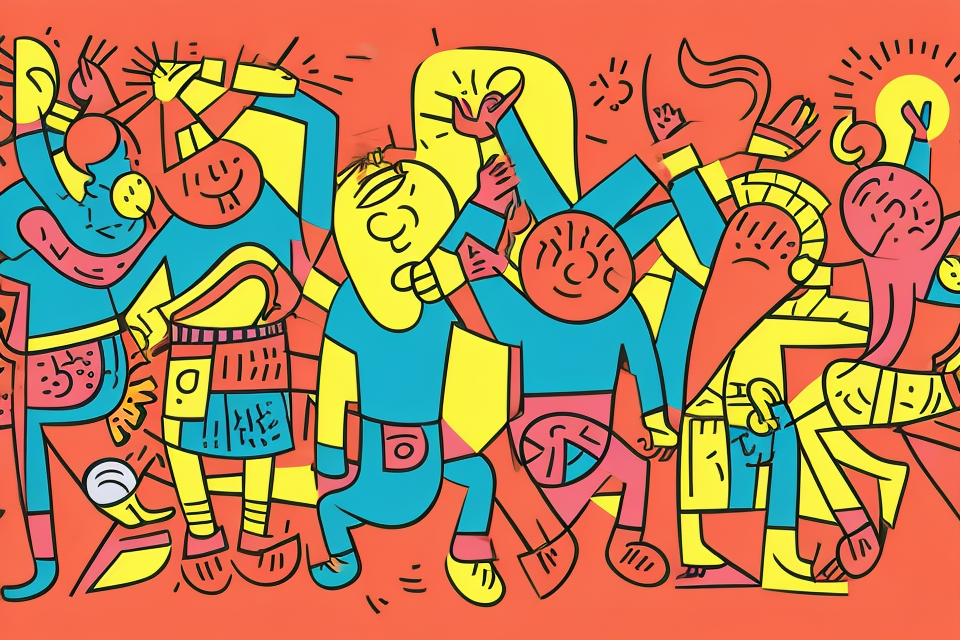The Importance of Cultural Understanding
Why we should learn about different cultures
- Exposure to diverse ways of life
- Expansion of our own beliefs and values
- Increased ability to navigate cross-cultural interactions
Exposure to diverse ways of life
Learning about different cultures allows us to gain a broader understanding of the world and the various ways in which people live their lives. By exploring different customs, traditions, and practices, we can expand our own perspectives and become more open-minded individuals.
Expansion of our own beliefs and values
Understanding different cultures also enables us to reflect on our own beliefs and values, and to question whether they are universal or culturally specific. This can lead to a deeper understanding of ourselves and our place in the world, as well as an increased ability to empathize with others who may have different beliefs and values.
Increased ability to navigate cross-cultural interactions
As our world becomes increasingly globalized, it is important to be able to navigate cross-cultural interactions with ease. By learning about different cultures, we can develop a greater understanding of how to communicate effectively with people from diverse backgrounds, and how to avoid cultural misunderstandings. This can be especially useful in professional settings, where successful cross-cultural interactions are essential for building strong relationships and achieving common goals.
How cultural understanding affects our lives
Cultural understanding has a profound impact on our lives, influencing everything from our communication and relationships to our worldview and perception of the world. Here are some specific ways in which cultural understanding can affect our lives:
Improves communication and relationships
When we understand different cultures, we are better equipped to communicate effectively with people from diverse backgrounds. This can help us build stronger relationships, both personally and professionally. By understanding cultural differences in communication styles, values, and norms, we can avoid misunderstandings and conflicts that might arise from cultural misinterpretations.
Broadens our worldview and understanding of the world
Cultural understanding helps us broaden our perspective and see the world through different lenses. By learning about other cultures, we can gain a deeper appreciation for the complexity and diversity of the world. This can help us become more empathetic and open-minded individuals, capable of understanding and appreciating different perspectives.
Helps us appreciate diversity and avoid cultural biases
Cultural understanding also helps us appreciate diversity and avoid cultural biases. When we are exposed to different cultures, we learn to recognize and challenge our own biases and assumptions. This can help us become more aware of our own cultural identity and how it shapes our perceptions of the world. By recognizing and appreciating diversity, we can become more inclusive and equitable individuals, capable of creating a more just and inclusive society.
How to Learn About Different Cultures
Cultural understanding is essential for building strong relationships, avoiding cultural misunderstandings, and navigating cross-cultural interactions effectively. It helps broaden our perspective, appreciate diversity, and become more inclusive and equitable individuals. Active learning strategies like traveling, engaging in cross-cultural exchanges, and attending cultural events, along with passive learning strategies like reading books, using language learning apps, and following cultural influencers on social media, can help in gaining a deeper understanding of different cultures. Overcoming barriers to cultural understanding requires being open-minded, curious, and actively seeking out information and perspectives that may conflict with our preconceived notions. The benefits of cultural understanding include increased self-awareness, improved communication and relationship-building skills, and enhanced creativity and problem-solving abilities. It also encourages mutual respect and cooperation, fosters economic and political stability, and promotes global peace and understanding.
Active learning strategies
Travel and immerse yourself in different cultures
Traveling to different countries and immersing yourself in the local culture is one of the most effective ways to gain a deeper understanding of different cultures. By experiencing different customs, traditions, and ways of life, you can gain a more authentic understanding of the culture and its people. This can involve trying local foods, visiting cultural landmarks, and interacting with locals.
Engage in cross-cultural exchanges and conversations
Engaging in cross-cultural exchanges and conversations is another effective way to learn about different cultures. This can involve speaking with people from different cultures, participating in cultural events, and joining cultural clubs or organizations. By engaging in these types of exchanges, you can gain a deeper understanding of different perspectives and ways of life.
Attend cultural events and festivals
Attending cultural events and festivals is another great way to learn about different cultures. These events provide an opportunity to experience different customs, traditions, and ways of life firsthand. This can involve attending religious festivals, cultural celebrations, and other events that showcase the unique aspects of a particular culture. By attending these events, you can gain a more authentic understanding of the culture and its people.
Passive learning strategies
Reading Books, Watching Movies, and Listening to Music
One of the most effective ways to learn about different cultures is through reading books, watching movies, and listening to music from those cultures. This can help you gain insight into the beliefs, values, and customs of the people from that culture. It is important to read books from different genres and written by authors from different cultural backgrounds. This will help you to gain a deeper understanding of the culture and its nuances.
Using Language Learning Apps and Websites
Another way to learn about different cultures is by using language learning apps and websites. These resources provide a wealth of information about different cultures, including their history, customs, and traditions. By learning the language of a particular culture, you can gain a deeper understanding of its people and their way of life. Additionally, these apps and websites often offer interactive exercises and quizzes, which can help reinforce what you have learned.
Following Cultural Influencers and Organizations on Social Media
Following cultural influencers and organizations on social media is another great way to learn about different cultures. Many cultural influencers and organizations use social media to share information about their culture, including its history, customs, and traditions. By following these influencers and organizations, you can gain a better understanding of the culture and its people. Additionally, social media provides a platform for people from different cultures to share their experiences and insights, which can be invaluable for those seeking to learn more about different cultures.
Barriers to Cultural Understanding
Common misconceptions and stereotypes
- The “us” vs. “them” mentality
- This mentality is prevalent in many cultures and often leads to division and conflict. It can be particularly dangerous when people start to view others as being fundamentally different or inferior to themselves.
- The notion that one culture is superior to another
- This is a dangerous idea because it can lead to cultural imperialism, where one culture seeks to dominate or erase other cultures. Cultural superiority can also lead to prejudice and discrimination against people from other cultures.
- Stereotyping and generalizing entire cultures
- Stereotyping is a form of prejudice that involves making broad generalizations about an entire group of people based on limited information. This can be particularly harmful when it comes to cultural understanding because it can prevent people from seeing the diversity within a culture and can lead to misunderstandings and conflicts.
- Generalizing entire cultures can also be problematic because it can lead to a lack of understanding of the unique experiences and perspectives of individuals within that culture. It is important to recognize that each person’s experiences and perspectives are shaped by their individual background and circumstances, rather than their cultural identity alone.
Overcoming barriers to cultural understanding
One of the biggest barriers to cultural understanding is a lack of exposure to diverse perspectives and experiences. Many people may only interact with individuals from their own cultural background, leading to a limited understanding of other cultures. To overcome this barrier, it is important to seek out opportunities to interact with people from different backgrounds and to actively listen to their experiences and perspectives.
Another barrier to cultural understanding is the presence of biases and assumptions. These biases can be both conscious and unconscious, and they can affect how we perceive and interact with people from different cultures. To overcome these biases, it is important to challenge our own assumptions and to actively seek out information and perspectives that may conflict with our preconceived notions.
Additionally, it is important to be open-minded and curious about different cultures. This means approaching interactions with people from different backgrounds with a willingness to learn and understand, rather than assuming that our own cultural background is superior or more “right” than others. By being open-minded and curious, we can overcome barriers to cultural understanding and build more meaningful connections with people from different backgrounds.
Benefits of Cultural Understanding
Personal benefits
Increased self-awareness and understanding
Developing an understanding of different cultures can provide an opportunity for individuals to gain a deeper understanding of themselves and their own cultural biases. By recognizing and challenging assumptions about one’s own culture, individuals can develop a more nuanced perspective on the world and their place within it.
Improved communication and relationship-building skills
Cultural understanding can also enhance communication and relationship-building skills. By learning about different communication styles, social norms, and expectations, individuals can adapt their own communication style to better navigate and build relationships with people from diverse backgrounds. This can lead to more effective and meaningful interactions with others, both personally and professionally.
Enhanced creativity and problem-solving abilities
Cultural understanding can also foster creativity and problem-solving abilities. By exposing oneself to new ideas, perspectives, and ways of doing things, individuals can expand their cognitive horizons and develop innovative solutions to complex problems. Additionally, cultural understanding can help individuals develop empathy and emotional intelligence, which are essential skills for navigating intercultural interactions and resolving conflicts.
Societal benefits
- Encourages mutual respect and cooperation
Cultural understanding fosters a deeper appreciation for the diversity of human experiences and traditions. It encourages individuals to recognize and respect the differences that exist among cultures, and to appreciate the value of these differences in promoting social harmony and cooperation. - Fosters economic and political stability
Cultural understanding can also contribute to economic and political stability by promoting cross-cultural collaboration and cooperation. By learning about and appreciating the customs and practices of other cultures, individuals and organizations can more effectively engage in cross-cultural business and diplomatic interactions, reducing the potential for misunderstandings and conflicts that can disrupt economic and political relations. - Promotes global peace and understanding
Perhaps most importantly, cultural understanding can promote global peace and understanding by reducing the potential for conflict and violence between different cultures. By learning about and appreciating the beliefs, values, and practices of other cultures, individuals and societies can develop a greater sense of empathy and shared humanity, reducing the potential for misunderstandings and conflicts that can lead to violence and war.
FAQs
1. What is cultural understanding?
Cultural understanding refers to the knowledge and appreciation of the customs, beliefs, values, and practices of different cultures around the world. It involves learning about the history, traditions, language, food, and art of a particular culture, as well as gaining insight into the daily lives of people from that culture.
2. Why is it important to learn about different cultures?
Learning about different cultures is important because it helps us to develop a broader perspective on the world and to appreciate the diversity of human experience. It can also help to promote mutual understanding and respect between people of different cultures, and to foster greater empathy and cooperation in the global community.
3. How can I learn about different cultures?
There are many ways to learn about different cultures, including:
* Reading books and articles about different cultures
* Watching documentaries and films about different cultures
* Traveling to different countries and immersing oneself in the local culture
* Taking courses or classes on different cultures
* Engaging in cultural exchange programs or volunteering abroad
* Joining cultural clubs or organizations that focus on a particular culture
4. What are some ways to show respect when learning about different cultures?
When learning about different cultures, it is important to show respect by:
* Avoiding stereotypes and generalizations about particular cultures
* Being open-minded and willing to learn
* Showing interest and curiosity about different cultures
* Being sensitive to cultural differences and avoiding cultural appropriation
* Respecting local customs and traditions
* Being mindful of cultural taboos and avoiding offensive language or behavior
5. How can I avoid cultural misunderstandings when learning about different cultures?
To avoid cultural misunderstandings when learning about different cultures, it is important to:
* Seek out accurate and reliable sources of information
* Ask questions and seek clarification when needed
* Be open to feedback and willing to learn from mistakes
* Avoid making assumptions about particular cultures
* Be aware of cultural differences in communication styles and body language
* Be patient and flexible when interacting with people from different cultures.



